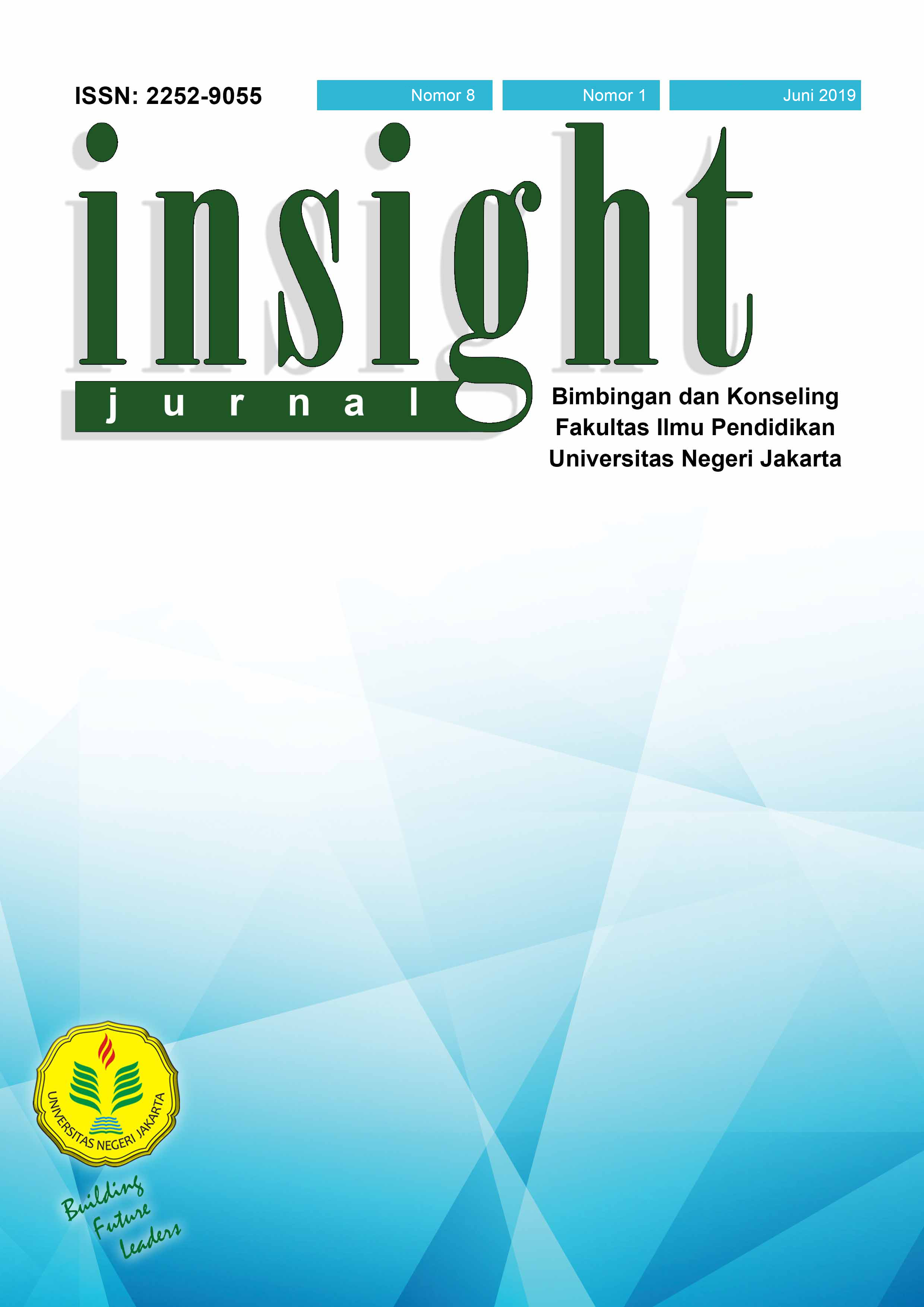Pengaruh Layanan Konseling Kelompok Dengan Teknik Problem Solving untuk Mengatasi Konflik antara Remaja yang Memiliki Insecure Attachment dengan Orang Tua
DOI:
https://doi.org/10.21009/INSIGHT.081.09Keywords:
Konseling Kelompok, Problem Solving, Konflik Orangtua Remaja, AttachmentAbstract
Penelitian ini bertujuan untuk mengetahui pengaruh layanan konseling kelompok dengan teknik problem solving untuk mengatasi konflik antara remaja yang memiliki insecure attachment dengan orang tua. Penelitian ini menggunakan Quasi Experimental dengan bentuk pretest-posttest Nonequivalent Control Grup Design. Teknik pengambilan sampel yang digunakan adalah purposive sampling. Sampel penelitian ini adalah 10 peserta didik dengan skor level intensitas konflik yang tinggi. Sampel penelitian ini dibagi menjadi dua kelompok, yaitu 5 orang dalam kelompok ekperimen dan 5 orang dalam kelompok kontrol. Instrumen yang digunakan dalam penelitian ini adalah relationship styles questionnaireI(RSQ) dan issue checklist(IC). Pengujian hipotesis menggunakan teknik Mann Whitney U-Test. Hasil pengujian hipotesis menunjukkan bahwa nilai Asymp.sig sebesar 0,008. Nilai probabilitas tersebut lebih kecil dibandingkan nilai signifikansi α (alpha) 0,05 yang digunakan dalam penelitian ini. Dengan demikian dapat disimpulkan bahwa H0 ditolak dan H1 diterima. Berdasarkan hasil penelitian dapat disimpulkan bahwa konseling kelompok dengan teknik problem solving memberikan pengaruh yang signifikan dalam menurunkan skor intensitas konflik antara remaja yang mengalami insecure attachment dengan orang tua.
References
Chatjoulis, A., & Humphreys, P. (2007). A Problem Solving Process Model for Personal Decision Support (PSPM-DS). Journal of Decision Systems, 16(2), 213–239. https://doi.org/10.3166/jds.16.213-239
Corey, G. (2012). Theory and practice of group counseling (8th ed.). Belmont, CA: Brooks/Cole.
D’Zurilla, T. J., & Goldfried, M. R. (1971). Problem solving and behavior modification. Journal of Abnormal Psychology, 78(1), 107–126. https://doi.org/10.1037/h0031360
Hughes, D., Bomber, L. M., & Brisch, K. H., & Perry, A. (2009). Helping Adolescents Engage with Life and Learning. Worth Publishing.
Jaffee, W. B., & D’Zurilla, T. J. (2003). Adolescent problem solving, parent problem solving, and externalizing behavior in adolescents. Behavior Therapy, 34(3), 295–311. https://doi.org/10.1016/S0005-7894(03)80002-3
Meichenbaum, D. L., Fabiano, G. A., & Fincham, F. (2002). Communication in relationship with adolescent. In F. W. Kaslow & T. Patterson (Eds.), Comprehensive Handbook of Psychotherapy, Cognitive-Behavioral Approaches (pp. 167–187). New Jersey: John Wiley & Sons.
Ningsih, A. D. (2012). Pengelolaan Konflik Orang Tua-Remaja Dalam Keluarga Jawa. Surakarta: Universitas Muhammadiyah Surakarta.
Prior, V., & Glaser, D. (2006). Understanding attachment and attachment disorders: Theory, evidence and practice. London: Jessica Kingsley Publishers.
Rice, F. P., & Dolgin, K. G. (2005). The adolescent: Development, relationships and culture (11th ed.). Auckland, New Zealand: Pearson Education New Zealand.
Robin, A. L., & Foster, S. L. (1989). The Guilford family therapy series. Negotiating parent–adolescent conflict: A behavioral–family systems approach. New York: Guilford Press.
Rusmana, N. (2009). Bimbingan dan Konseling Kelompok di Sekolah (Metode, Teknik, dan Aplikasi). Bandung: Rizqi Press.
Santrock, J. W. (2011). Life Span Development (5th ed.). Jakarta: Erlangga.
Sillars, A., Smith, T., & Koerner, A. (2010). Misattributions contributing to empathic (in)accuracy during parent-adolescent conflict discussions. Journal of Social and Personal Relationships, 27(6), 727–747. https://doi.org/10.1177/0265407510373261
Sugiyono. (2016). Memahami Penelitian Kualitatif. Bandung: Alfabeta.
Downloads
Published
Issue
Section
License
Authors who publish with this Journal agree to the following terms:
- Author retain copyright and grant the journal right of first publication with the work simultaneously licensed under a creative commons attribution licensethat allow others to share the work within an acknowledgement of the work’s authorship and initial publication of this journal.
- Authors are able to enter into separate, additional contractual arrangementfor the non-exclusive distribution of the journal’s published version of the work (e.g. acknowledgement of its initial publication in this journal).
- Authors are permitted and encouraged to post their work online(e.g. in institutional repositories or on their websites) prior to and during the submission process, as it can lead to productive exchanges, as well as earlier and greater citation of published works.
Users/public use of this website will be licensed to CC BY







